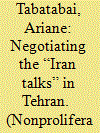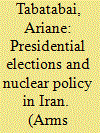|
|
|
Sort Order |
|
|
|
Items / Page
|
|
|
|
|
|
|
| Srl | Item |
| 1 |
ID:
156278


|
|
|
| 2 |
ID:
138334


|
|
|
|
|
| Summary/Abstract |
This article assesses Iran's strategy in dealing with the threat of the Islamic State in Iraq and Syria (ISIS). It examines the implications of the rise of ISIS in Iran's immediate neighbourhood for Tehran's policies in Syria and Iraq and investigates how each of these countries affects Iranian national interests. It provides an overview of the major events marking Iran and Iraq's relations in the past few decades and discusses the strategic importance of Iraq for Iran, by looking at the two countries' energy, economic and religious ties. It also considers Iran's involvement in Syria since the beginning of the Syrian conflict. The article sheds light on the unilateral action taken by Tehran to counter ISIS, the adjustments it may have to make to its involvement in Syria, and the potential areas for tactical cooperation between Iran and the United States, as well as other key regional states such as Saudi Arabia. The article investigates three likely scenarios affecting the developments in Iraq and Iran's possible response to them as the events in the Middle East unfold.
|
|
|
|
|
|
|
|
|
|
|
|
|
|
|
|
| 3 |
ID:
157820


|
|
|
|
|
| Summary/Abstract |
When Iran and the world powers resumed negotiations over Tehran’s controversial nuclear program after a seven-year lull, Iran’s hardline President Mahmoud Ahmadinejad was approaching the end of his second and last term. During that time, little progress was made. After the election of the moderate Hassan Rouhani to the presidency, the talks resumed decisively. Rouhani and his team were in an ideal position to strike a deal, as they were afforded cross-party support supplying them with political will and political capital. To succeed, they had to pursue several goals, including sanctions relief and reintegrating their country into the international community, while ensuring that the nuclear program remained viable within the limits they had to respect. They also had to balance several audiences in Iran and the broader international scene. They operated within the “red lines” developed to reassure various factions within the regime and populace and formalized by Supreme Leader Ayatollah Ali Khamenei. These priorities and limitations shaped the form, substance, and language of the resulting document, the Joint Comprehensive Plan of Action completed and signed on July 14, 2015, in Vienna.
|
|
|
|
|
|
|
|
|
|
|
|
|
|
|
|
| 4 |
ID:
121704


|
|
|
|
|
| Publication |
2013.
|
| Summary/Abstract |
The Iranian presidential election will take place on June 14. It will mark the end of Mahmoud Ahmadinejad's presidency, which was notable for controversies surrounding his second-term election and the tightening of the international community's backbreaking and unprecedented sanctions against the country, leading to the devaluation of Iran's currency.
|
|
|
|
|
|
|
|
|
|
|
|
|
|
|
|
| 5 |
ID:
141315


|
|
|
|
|
| Summary/Abstract |
Iran’s domestic politics and power structure have been a source of puzzlement and conjecture since the country’s 1979 revolution, which toppled a U.S. ally and brought the Islamic Republic to power. This bewilderment intensified during the nuclear negotiations between six world powers collectively known as the P5+1 (China, France, Germany, Russia, the United Kingdom, and the United States) and Tehran.
|
|
|
|
|
|
|
|
|
|
|
|
|
|
|
|
| 6 |
ID:
147227


|
|
|
|
|
| Summary/Abstract |
When the Houthi rebels took control of Yemen's capital, Sanaa, in September 2014, Arab Gulf officials and Western pundits claimed that Iran was aiming to export its revolutionary ideology and establish a Shia empire throughout the Middle East.11. Ali Mamouri, “Leaked Cables Show Gulf Leery of Shiite Expansion,” Al-Monitor, June 26, 2015, http://www.al-monitor.com/pulse/originals/2015/06/gulf-fears-shiite-expansion-wikileaks-saudi-arabia-iran.html.View all notes They claimed that Iran was doing so by backing, perhaps even controlling, the Shia Houthis. The Houthi takeover came at a critical point for the region: Tehran was in the midst of negotiations to resolve the crisis surrounding its nuclear program. The resulting deal provided Tehran with sanctions relief and removed some of the barriers to Iran's reintegration into the international community. Some already wary Gulf Arab states viewed the success of the talks as an end to Iranian isolation, with the country fixing its broken ties to the West and reasserting itself as a top regional power.
|
|
|
|
|
|
|
|
|
|
|
|
|
|
|
|
|
|
|
|
|